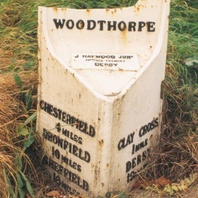
Viking Names
Woodthorpe
Woodthorpe, in the Scarsdale Hundred of Derbyshire, is an Anglo-Scandinavian hybrid name from Old English wudu ‘a wood; or wood, timber’ and Old Norse þorp ‘a secondary settlement, a dependent outlying farmstead or hamlet’.
Read More
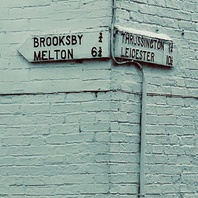
Viking Names
Brooksby
Brooksby, in the East Goscote Hundred of Leicestershire, is a difficult name. The first element is likely the Old Norse male personal name Brok which was originally a byname derived from Old Norse brók ‘breeches’. Alternatively it has been suggested that the first element is Old English broc ‘a brook, a stream (used of a stream with a muddy bed and a visible sediment load)’. This brook may refer to the River Wreake or more likely a small stream which rises near Brooksby. The first element could also be the Old Danish cognate brok ‘bog, marsh’ which is found in place-names in Denmark. However, these elements do not otherwise show a genitival structure whereas the personal name does. The second element of the name is Old Norse by ‘a farmstead, a village’.
Read More
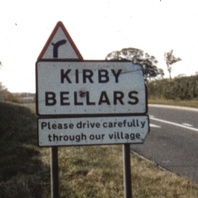
Viking Names
Kirby Bellars
Kirby Bellars, in the Framland Hundred of Leicestershire, comes from the Old Norse elements kirkja ‘church’ and by ‘farm, settlement’. The affix Bellars is derived from the personal surname Beler. Hamo Beler held the manor in 1166 and it remained in the family as late as 1361.
Read More
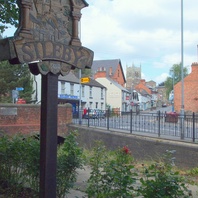
Viking Names
Sileby
Sileby, in the East Goscote Hundred of Leicestershire, comes from the Old Norse male personal name Sigulfr and the Old Norse element by ‘a farmstead, a village’.
Read More
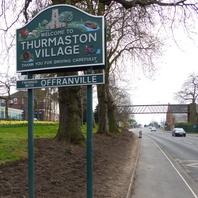
Viking Names
Thurmaston
Thurmaston, in the East Goscote Hundred of Leicestershire, is an Anglo-Scandinavian hybrid from the common Old Norse male personal name Þormóðr and Old English tun ‘an enclosure; a farmstead; a village; an estate’. A few thirteenth and fourteenth century spellings of Thurmaston seem influenced by the Old Norse male personal name Þormundr. A large pagan, Anglian cemetery has been discovered here, no doubt that of an important early settlement site preceding Scandinavian appropriation.
Read More
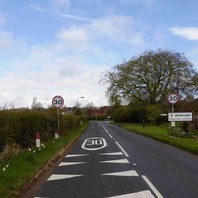
Viking Names
Worlaby
Worlaby, in the Yarborough Wapentake of Lincolnshire, is a hybrid name coming from the Old English male personal name Wulfric and Old Norse by ‘farm, settlement’, identical with Worlaby in the Hill Wapentake of Leicestershire, now a lost village. The two Domesday book spellings in Ulu- are presumably Scandinavianised forms.
Read More
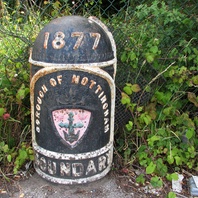
Viking Names
Nottingham
Nottingham is one of the Five Boroughs of the Danelaw. The place-name is comprised of three Old English elements: the male personal name Snot, ingas ‘people of, the people called after’ and ham ‘a village, a village community, a manor, an estate, a homestead’. Thus the name means ‘Homestead/village of Snot’s people’. It is likely that the same man or people gave his name to the adjacent Sneinton. There is an older British name for Nottingham, Tigguocobauc ‘house of caves, cavy house’, alluding to the sandstone caves of Castle Hill. However, there is no other record for this name outside of Asser’s reference for 868. According to the Anglo-Saxon Chronicle, Nottingham was occupied by the Great Heathen Army in 867 and remained under Scandinavian control until 918, when it was occupied by Edward the Elder. The influence of these Vikings can be seen in the city of Nottingham’s street names. The Old Norse element gata ‘path, way, road’ can be found in street names such as Barker Gate ‘street of the barkers or tanners’, Castle gate ‘street leading to the castle’, and Fisher Gate ‘street of the fishermen’.
Read More
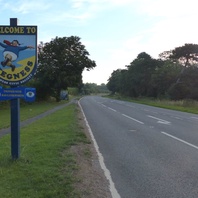
Item
Skegness
Skegness, in the Candleshoe Wapentake of Lincolnshire, is a Scandinavian compound, but the meaning of the place-name is uncertain. One suggestion is ‘Skeggi’s headland’ from the Old Norse male personal name Skeggi and the Old Norse element nes ‘ a ness, a headland, a promontory’. More likely, the first element could be the Old Norse element skegg ‘beard’, ‘something jutting out’, which is related to the verb skaga and the topographical term skagi ‘promontory’. This Old Norse appellative is probably found in the two Skegby place-names in Nottinghamshire.
Read More
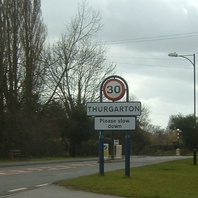
Viking Names
Thurgarton
Thurgarton, in the Thurgarton Wapentake of Nottinghamshire, comes from the Old Norse male personal name Þorgeirr (though in an anglicised form Þurgar) and the Old English element tun ‘farm, settlement’, and is thus a hybrid name.
Read More
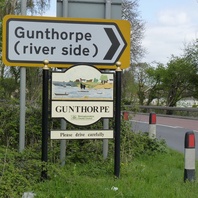
Viking Names
Gunthorpe
Gunthorpe, in the Thurgarton Wapentake of Nottinghamshire, comes from the Old Norse female personal name Gunnhildr and the Old Norse element þorp ‘outlying farm/settlement’.
Read More

Viking Names
Sturston
Sturston, in the Appletree Hundred of Derbyshire, comes from the Old Norse male personal name Stýrr and the Old English element tun ‘farm, settlement’. It is thus a hybrid name. The Domesday Book mentions Sturston Hall as one of two manors held by Ulfkil ‘Ulfkell’ and Wudia ‘Wodi’, each manor being of half a carucate (a Danish land measure) each. Parts of the parish were transferred to Bradley and Offcote and Underwood and the rest to Ashbourne in 1934.
